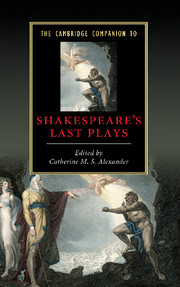Book contents
- Frontmatter
- Introduction
- 1 What is a ‘late play’?
- 2 Blackfriars, music and masque: theatrical contexts of the last plays
- 3 The literary and dramatic contexts of the last plays
- 4 Politics, religion, geography and travel: historical contexts of the last plays
- 5 ‘You speak a language that I understand not’: listening to the last plays
- 6 The Winter’s Tale: shifts in staging and status
- 7 Cymbeline: the afterlife
- 8 Literary invocations of The Tempest
- 9 Pericles: the afterlife
- 10 The Two Noble Kinsmen and King Henry VIII: the last last plays
- Further reading: Clare Smout
- Index
4 - Politics, religion, geography and travel: historical contexts of the last plays
Published online by Cambridge University Press: 28 May 2010
- Frontmatter
- Introduction
- 1 What is a ‘late play’?
- 2 Blackfriars, music and masque: theatrical contexts of the last plays
- 3 The literary and dramatic contexts of the last plays
- 4 Politics, religion, geography and travel: historical contexts of the last plays
- 5 ‘You speak a language that I understand not’: listening to the last plays
- 6 The Winter’s Tale: shifts in staging and status
- 7 Cymbeline: the afterlife
- 8 Literary invocations of The Tempest
- 9 Pericles: the afterlife
- 10 The Two Noble Kinsmen and King Henry VIII: the last last plays
- Further reading: Clare Smout
- Index
Summary
In the Newberry Library, there is a copy of a manuscript letter from a courtier to his 'sweete heart', describing his impressions of Scotland, a place he was visiting in the train of one of the Stuart kings. 'The countrey,' he noted, 'although itt be mountainous affoords no monsters but Women': “The Ladies are of opinion yt Susanna could not bee chast because Shee bath'd so often. Pride is a thing bredd in theire Bones, and theire Flesh naturally abhorrs Cleanliness. Their Breath most commonly stinks of Pottage, their Linnen of Pisse, their Hands of Piggs turds, their Bodies of Sweate, and itt is a Position of Bellarmins to weare socks.” / Years after James VI of Scotland had travelled to England to take up Queen Elizabeth I's crown, bringing with him not only an entourage of Scots, but a determination to unite his two realms, an Englishman at court was still evincing humorously satirical reservations about his northern neighbours. Such comments draw attention to tensions present from the start of James I's reign: the Scots were perceived by many in England as poor and backward and there was resistance on both sides to integration. Although a pamphlet poem such as the anonymous Englands Wedding Garment, or a preparation to King James his Royall Coronation (1603) might celebrate James's succession as a fortunate marriage, there was clear anxiety about the kind of baggage the new king would bring with him. Englands Wedding Garment is a profoundly unaccomplished poem that nevertheless invokes the major iconographic themes of the start of the Jacobean reign.
- Type
- Chapter
- Information
- The Cambridge Companion to Shakespeare's Last Plays , pp. 71 - 90Publisher: Cambridge University PressPrint publication year: 2009

